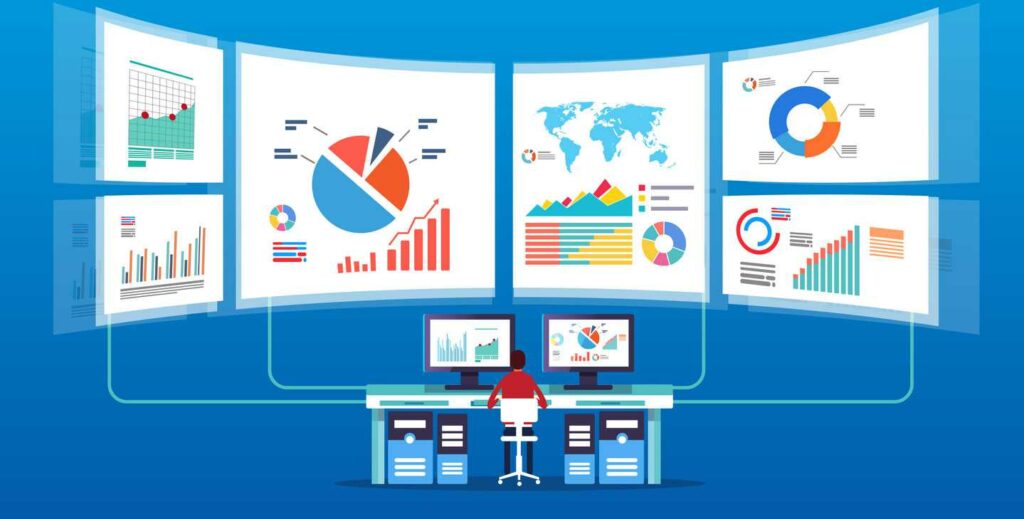
In the modern world of digital technology, at the very least, 1.7 billion MB of data are generated every second. Data analytics convert the estimated 1.145 trillion megabytes of data newly generated daily into valuable knowledge.
What can analytics of data do with this information? They are modern-day storytellers that make vast amounts of data available to inform us of what’s happened and what’s happening now, and what’s expected to occur shortly. This includes everything from purchasing habits and product preferences to health statistics and trends in the population.
Data-driven insights can be beneficial in all aspects of our life. Data analytics typically can combine various talents, including technical abilities, effective communication, and leadership abilities. Thus, jobs in data analysis provide professionals with diverse job opportunities with high earnings potential and exciting leadership positions with the ability to influence the future.
What is Data analytics?
Data analytics is the process of analyzing raw data to analyze data, find patterns, draw correlations and draw conclusions from the results. Artificial intelligence and machine learning let analytics run analytics on a large scale and efficiently search through the massive archive of Big Data. Automation and advanced technology are crucial, but companies still require trained data analytics to manage and communicate data for the human eye.
The process of democratizing data is in progress, and analytics of the data are becoming readily available and less technical so that both consumers and professionals can better comprehend the use of data and its significance of it. Companies require more data analytics, so the demand for jobs in data analysis continues to rise. The employment forecast for data analytics and data analytics through 2023 is growing.
5 reasons why you should learn data analytics
Better Career opportunities-
What is the reason a company goes through a rebranding process, or what is the process by which Netflix creates content for us? The answer lies in the work of data analytics. You can learn to make the most of the data you work with rather than rely on your intuition and assumptions. In that case, you will significantly impact the company’s business decision-making and performance if you have a solid understanding of data that you can study trends in social media engagement as well as customer purchasing patterns and other demographic information to help you achieve your sales targets and communicate with your target audience.
Boost your problem-solving skills-
analytics is the use of data to address issues. The ability to challenge the brain’s ability to think critically and discover solutions in fresh ways is valuable in both your personal and professional life. Continuously working on problem-solving can help you think outside the box, operate under pressure, communicate effectively, and ultimately be more valuable to any company.
Jobs are lucrative and well-paid
Everyone wants to be paid well for their work, and it’s 100% certain that you’ll find yourself working in the field of data analytics! According to Glassdoor, the base salary for a Data analytics in the US is around $62,000, with experienced professionals earning $80,000 or higher.
Data analytics careers are full of growth and job diversification opportunities
Technology giants, from Google to retail stores like Walmart, are always seeking to fill roles based on data. If you take the initiative to master the art of data analysis, you can work across a range of industries.
Finance, higher education health, higher education, and many more require your expertise in data analytics to aid them in making better choices! The field of data analytics also provides a variety of specializations according to the sector, which means that you can narrow your focus to sales, marketing operations, or other areas that you are interested in most.
If you’re feeling frustrated in your current job or need a fresh task, learning about data analytics could be the best chance to develop within your organization and take on exciting new challenges.
Highly sought-after jobs-
As the boom in data spreads across many industries, the ability to analyze data is in increasing demand. Companies can’t keep up with the rising demand for the field, and it’s been reported that the Government of Canada predicts an increase in demand for workers in the field of data analytics in the coming 10 years. This means you can choose the company you employ yourself for, they pay you’re seeking, and the field you’d like to focus on.
Different types of Data analytics
Six distinct kinds of data analytics are used to analyze data in data science and Big Data, each with specific goals and processes. The six main kinds of data analysis are:
Descriptive Analysis: It is used to summarize and describe an entire data set in a simple-to-understand manner. Descriptive analytics is typically the first type of Analysis and consists of general summaries and measures.
Exploratory Analysis (EDA): It is an examination or investigation of the connections between data. Exploratory analytics start with the hypothesis-building process by identifying patterns in the data set.
Inferential Analysis: The goal is to conclude large populations from smaller data sets by using actual samples that do not allow for generalizations.
Predictive Analysis: Using past data to predict future behavior, actions, or events.
Causal Analysis: Determine cause-and-effect connections through the study of the correlation of data.
Mechanistic Analysis: It is a precise method for determining the real changes that cause changes within other parameters.
What are Data analytics’ Tasks?
Data analytics: It involves assist organizations in making sense of data by organizing, visualizing, and describing data sets. The job for a professional in the field of data analysis is contingent on the field they work in and the type of Analysis they employ, however generally, data analytics are responsible for five things:
Collect data: The main task of a data analytics is to discover sources of information, such as from surveys and corporate websites to third-party information suppliers. In many instances, the Data Scientist will provide analytics with working data sets.
Clean data: It involves arrange data and filter out any irrelevant data, also called “cleaning” information. This means improving the data’s quality and removing errors before entering it into a programming spreadsheet or language.
Model data: It involves analytics classify data and arrange the data in an attractive format.
Analyze data: Data analytics need to analyze the data to draw conclusions that include prescriptive or predictive suggestions.
Present data: analytics need to use data visualization to display data in attractive graphs and charts or other forms and then communicate their conclusions to the leaders of teams, teams, and other stakeholders.
Are you interested in learning about data analytics?
Many of the associated abilities you’ll acquire through studying data analytics can be used daily. The ability to explain complex information to management at a high level can aid in improving your communication beyond the office, and understanding how to organize information efficiently can help with your budgeting. Real-world applications are infinitely useful!
FunctionUp’s easy-to-learn Data analytics course will teach you the basics quickly. You’ll be able to make data-driven choices at work, streamline your workflow, and comprehend your clients using in-demand tools and languages like Google Sheets, SQL, and Tableau. For more information visit our website.
